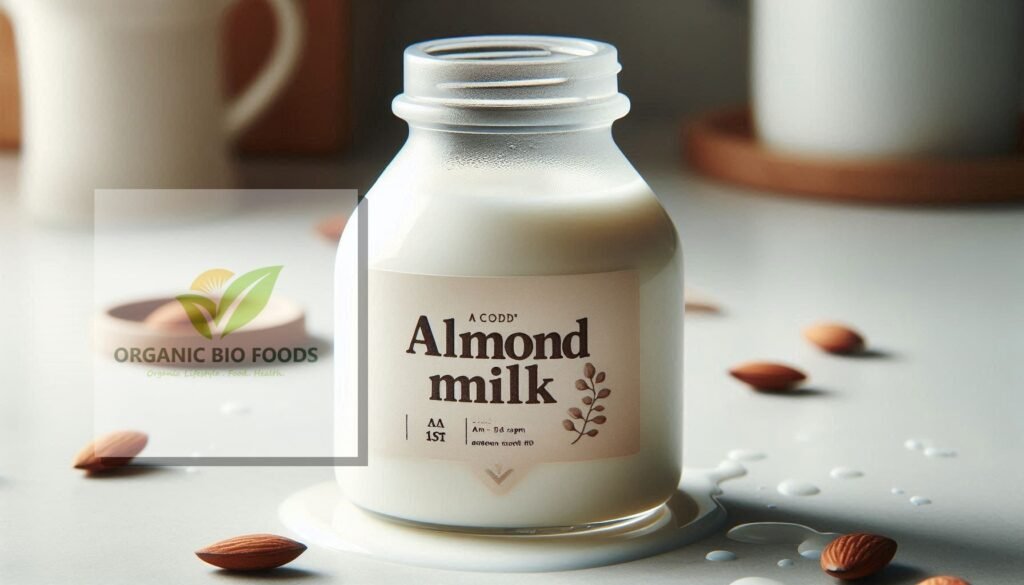Almond milk has been growing in popularity, and it’s not hard to see why. Whether you’re lactose intolerant, following a plant-based diet, or simply looking for a healthier option, almond milk is a fantastic choice. It’s creamy, tasty, and packed with health benefits you might not know about. Let’s explore five surprising health perks of drinking almond milk!
1. Almond Milk is Lactose-Free and Easy to Digest
For those who are lactose intolerant or have trouble digesting dairy, almond milk is a perfect solution. Since it’s made from almonds, it’s naturally lactose-free and won’t cause the digestive discomfort that can come from drinking cow’s milk. Almond milk is also free of the hormones and antibiotics sometimes found in regular milk.
According to Healthline, “Almond milk is naturally free of lactose, which makes it easier to digest for people who are lactose intolerant or have dairy sensitivities”
Why It’s Great:
- Lactose-free, making it gentle on your stomach.
- Perfect for people with dairy allergies or lactose intolerance.
2. Almond Milk is Very Low in Calories but High in Nutrients
If you’re watching your calorie intake, almond milk is a great option! Unsweetened almond milk typically contains only 30 to 50 calories per cup, which is significantly lower than regular cow’s milk, which has about 150 calories. Despite being low in calories, almond milk is rich in vitamin E, a powerful antioxidant that helps protect your cells from damage.
Again according to Healthline, “Unsweetened almond milk is low in calories and contains vitamin E, which helps keep your skin healthy and protects your cells from oxidative stress”
Why Organic Almond Milk is Great:
- Fewer calories mean you can enjoy it without worrying about weight gain.
- Packed with vitamin E, which is good for your skin and overall health.
3. Organic Almond Milk is Great for Bone Health
Even though almonds don’t naturally contain a lot of calcium, most store-bought almond milks are fortified with calcium and vitamin D. These two nutrients are essential for keeping your bones strong and healthy. Drinking almond milk regularly can help prevent conditions like osteoporosis, especially as you age.
According to WebMD, “Many almond milk brands are fortified with calcium and vitamin D, making it a great alternative to dairy for maintaining bone strength”.
Why Organic Organic Almond Milk is Great for Bone HealthGreat for Bone Health Great:
- Organic Almond Milk is fortified with calcium and vitamin D, which help keep your bones strong.
- A great alternative to dairy milk for people who are lactose intolerant.
4. Organic Almond Milk Promotes Heart Health
Almond milk is naturally free of cholesterol and saturated fat, making it a heart-friendly choice. It’s also high in healthy fats like omega-3s, which are known to reduce the risk of heart disease. Many almond milk brands also fortify their products with essential nutrients like vitamin D and calcium, further supporting heart health.
As Mayo Clinic points out, “Foods rich in vitamin E, like almond milk, can help protect against heart disease by reducing bad cholesterol levels and improving overall heart function”.
Why It’s Great:
- Contains no cholesterol or unhealthy fats, so it’s good for your heart.
- Omega-3s help reduce the risk of heart disease.
5. Helps Control Blood Sugar
If you’re looking for a milk alternative that won’t spike your blood sugar, unsweetened almond milk is a great choice. It’s naturally low in sugar and carbohydrates, making it an excellent option for people with diabetes or anyone trying to control their blood sugar levels. Unlike cow’s milk, almond milk won’t cause sudden blood sugar spikes.
Medical News Today explains, “Unsweetened almond milk contains very few carbohydrates, which helps keep blood sugar levels stable, making it a good option for people with diabetes”.
How Organic Almond Milk Helps Control Blood Sugar:
- Organic Almond Milk is low in carbs and sugar, making it good for blood sugar control.
- Organic Almond Milk is also great for people with diabetes or anyone wanting to avoid sugar spikes.








